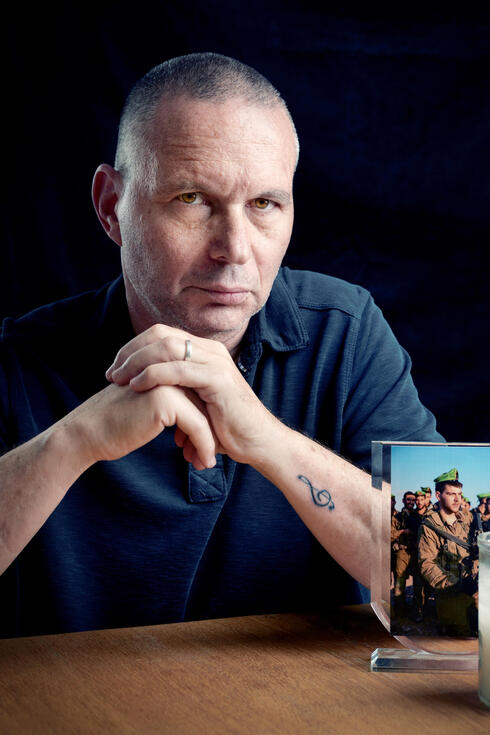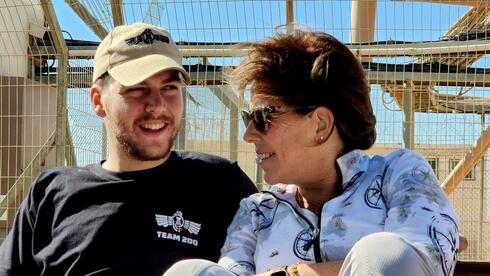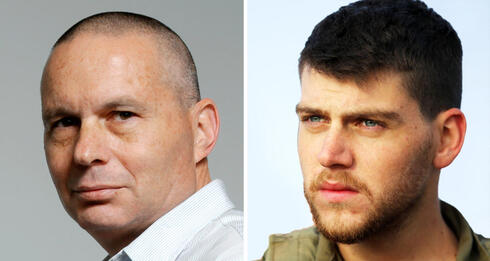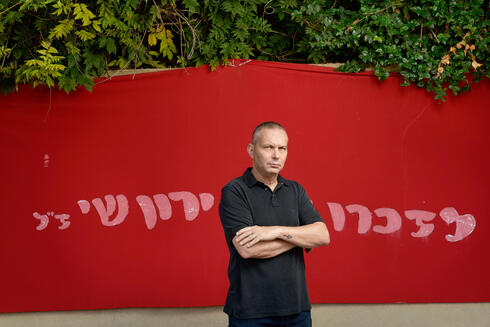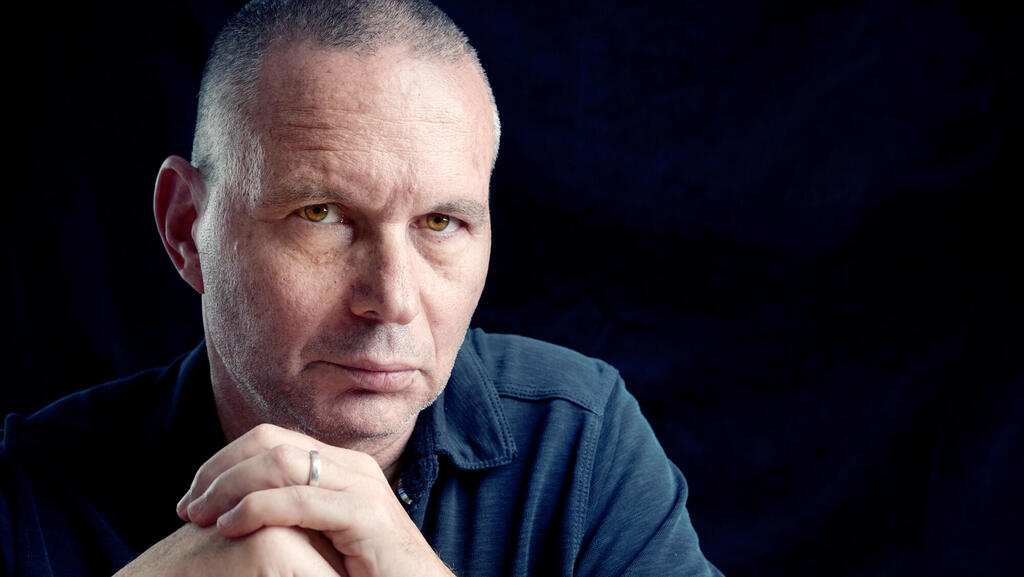
ISRAEL AT WAR
Rise up nation: Bereaved father calls for 1,400 new startups in memory of Israelis murdered by Hamas
On October 7th, Izhar Shay lost his son Yaron, a Nahal Brigade fighter who was killed in the Battle of Kerem Shalom. In a heart-wrenching interview, the former MK and veteran high-tech entrepreneur provides a sobering view of his family and a look into his initiative to establish a new startup for every fallen soldier and murdered civilian
"We are a very, very close family. I liken it to a vase that has crashed into pieces on the floor, and you don't know how to pick it up. You try to pick up piece by piece. We are motivated to pick up the pieces and build something new, but it is clear to us that we will not return to what was before. Life will continue alongside the painful knowledge that we have lost a child so dear to us. After all, I come from the high-tech world, where you know what product you want to reach and then go backward to achieve it. My wife Hila told us this week: 'I don't know how we will get there, but we will be a happy family. We will travel, laugh, dance, but it will always be with the knowledge of what we have lost.’ We want to be a happy family again and build a new life. The question now is how to put the pieces of this small family together and get there."
Izhar Shay says the things in a measured, restrained tone. Yes, there is a goal, there is a mission. And surrounding him is a pain for which there are no words. This is felt in a conversation with Shay, a well-known entrepreneur and investor in the high-tech world and former Minister of Science, two weeks after he buried his son Yaron (nicknamed Noni), a sergeant in the Nahal Brigade. It’s felt at home, at every moment, in the faces of the family members and friends with him, even after the shivah (week of Jewish mourning) has ended. And he wore it on his wrist, in the shape of a musical note, a G clef (Sol). This was Yaron's tattoo, now it is also the tattoo of his father, brother, and other family members.
"Four years ago, Yaron went to get a tattoo and came back with it. We asked him, 'What is it?' He answered, 'I love music, and sol is also the initials of my brothers' names, which are the most important to me in the world, so now they are engraved on my hand.' Hila went with him then and got a tattoo of an anchor on her leg. Noni said: 'Dad, come, do it too', and I said: 'Noni, you know me, I'm square, I can't do something from which there is no turning back.' So he answered me: "You make me laugh. You raised four children and now you're telling me this nonsense?"
And now, you got up from Shivah and went to get his tattoo.
"A week ago the brothers, their partners, cousins, in total 13 people came and said to me: 'We are getting Yaron's tattoo. Will you join?'. I said: 'Let’s go, I'm coming.' This time it was easy. It was amazing to find a group like us in a tattoo studio. When we did the tattoo some of us cried. He tattooed his brothers on his arm, I had it tattooed on my body. Now I carry something of him with me until the day I die."
"They didn't come to inform us. We were desperate for news."
Until that deadly Saturday of October 7th, the members of the Shay family had a fairly happy year. A first grandchild was born to Izhar and Hilla (both age 60), from their eldest daughter Shir (33). Hila marked five years since she overcame cancer. Lior (30) got married. Ofir (26) established his career and was about to relocate to the United States on behalf of the high-tech company where he works, preparing to manage an international team. Yaron (21) also had big plans and dreams. In the preparations for his brother's wedding, he took a picture with his girlfriend Mika and a ring and announced: "You will come to our wedding soon."
Then came that fateful October 7th when one family’s personal tragedy was combined within a large national tragedy. Yaron was on a routine patrol with two other brigade members, and they were the first to encounter terrorists who breached the fence in the Kerem Shalom area. They were only three skilled soldiers against dozens of terrorists, but they managed to protect the nearby kibbutz and outpost from the terrorists.
"They were prepared for battle, but from the first moment they fought they were few against many," says his father. "Bottom line, they achieved what is expected of the army: they protected the citizens. Kerem Shalom, the kibbutz closest to the border, did not fall, and the female IDF soldiers serving as lookouts who were in the operations room were also saved. The soldiers protected them with their bodies. The Hamas terrorists, out of frustration, threw grenades, shot into the rooms, and tried to enter. It was a heroic battle for the soldiers who were there, but the cost, the dead and wounded, is terrible, and that's because they were numerically outnumbered." Here he stopped for a moment. "The Nahal commander was killed, the patrol commander was killed, the company commander of Orev was killed, our Yaron, and other soldiers were killed, some are missing, and some are mortally and seriously wounded. You have the State of Israel, with its very strong army, the IDF, but in the end it's a battle of the few against the many, just like it was when Israel was founded in 1948."
After Yaron was killed, the casualty officers did not come to the family home. "They didn't come to inform us,” says the father. “We were so worried throughout that Saturday (Oct. 7th). It was clear to us that something had happened, and at night we learned that one of the soldiers in the team, Omer, was seriously wounded, hospitalized, sedated and ventilated at Hadassah Hospital in Jerusalem. Yaron's girlfriend Mika also tried to get answers, and we finally decided to go to Hadassah".
Related articles:
- "For every fallen soldier, for every murdered civilian, let’s put together a new innovative startup," says entrepreneur Izhar Shay, whose son was killed by Hamas
- How tech led the IDF to lose touch with reality and fail to thwart Hamas
- Israeli tech companies rally to support IDF soldiers and victims of Hamas terror
What happens to you in the meantime?
"It’s a difficult journey. We knew that the minimum we were looking for was a seriously injured soldier. I started talking to God and made a vow. I said...", he stops, choking on tears, sipping water, taking a deep breath. "I said that if Yaron lives and gets out of the situation he is in, I will extract from him and Mika a promise that they get married, and I will take care of all their needs until they manage in life with a profession. That was my vow. I thought that God cares, that he wants married people. But I didn't have to keep the vow , at Hadassah we found out that he died. God forgive me. He didn't fulfill his part either."
On top of the pain of the terrible loss is another pain, small but stinging. "When Noni's friends returned to the base after two or three days of fighting, they discovered that the generator their parents bought had been stolen, and that a container of personal equipment had been broken into. They stole phones, credit cards, and other items," says Shay. "We don't know exactly about Noni's items, we received conflicting information, and we pray that his things, the phone, a small book of Psalms that is passed down in the family, were not stolen. Even if only toothpaste or a t-shirt were stolen, it is a feeling of terrible pain and humiliation. We had no strength to check charges on his credit card. If someone is now walking around with Noni's credit card and 'partying' on it, I simply have nothing to say about it."
"It's important for me to know everything"
How important is it to you to understand what happened in the battle itself, including the war and surrounding events?
"Very important. But you think, what does it matter? My son is dead. But I can't imagine a mission more important than this. It's important to me to know everything. All we've collected so far are testimonies from soldiers who were there. And now we're turning it into a high-tech project, collecting big data that will be processed with artificial intelligence tools. Everyone will be able to enter their data to accumulate enough information to be able to analyze. I swore on Yaron's grave that my life's mission is to understand what the hell happened here."
These are the words he said at the funeral: "I am angry, seething. My Yaron, a soldier in a patrol, in the strongest army in the region, finds his death in a heroic battle of three soldiers against dozens of enemy fighters. How the hell did we get to this? I swear, Noni, I will not rest and I will not be silent until we understand everything. What brought us to this point. If there are people who could have prevented the oh-so-unnecessary death of our heroes- the mission of my life will be to find them, to understand in what areas they failed. Not because of revenge, God forbid, because of the need for correction."
It is important for you to emphasize this goal.
"Yes. There are people who come from a place of vendetta, of firing the prime minister. But I don't come from that place. But if we don't properly understand what happened and make amends, we are committing a sin for future generations. We must seriously get to the root of the matter, these are deep things."
For example?
When I didn't know that Yaron had been killed, a friend called me, a Major General from a reserve battalion, who said to me: 'We don't have headlamps and we are entering a night mission along the Gaza border, can you help me organize 200 of them?'. In the end they received them as a donation. The IDF sent them to fight without headlamps. It is impossible to treat soldiers as expendable equipment."
And how can your data project help fix all of this?
"We will collect endless pieces of information like this - the flashlight that was missing, if a jeep didn't work, problems with communications systems. You don't need the cooperation of the army, just people's testimonies, and you don't need classified information, just collect the big data. You need to understand how to turn this into information that a machine understands, and artificial intelligence will run on that and sort into categories. Many things that have happened over the last 10 or 20 years that have proven to be a fallacy of perception will also come into play here - that Hamas is deterred, that the security fence is enough. This is about much more than equipment that does not work. There will be endless material, and anyone who wants can access the data, choose a topic and research. It is not yet active, but there is already a team that is perfecting the project. Until we get going, I ask people to collect everything they have and save it."
Does the desire to take revenge arise sometimes, even for a moment?
"I don't want to beat anyone up. I'm frustrated and angry that we've reached a situation of few against many. But revenge? It won't bring my son back to me. One of our mottos at home is 'deal with what you can influence. Everything else is a distraction.' Regarding Hamas - I look at it practically. This thing must be destroyed. If we don't eliminate it, it will happen again, and if not here - in Paris or London. Every normal person understands that those who are capable of abusing babies, children, women and entire families for the sake of abuse, while some of the other members of the family are watching this happen, and then to murder them - you have to be destroyed."
"He gave his soul. He could have been a leader"
Shay also says these painful things quietly. But he admits that he can't keep the pain inside all the time. "Yesterday was the birthday of our firstborn, Shir. She asked: bless me as if it were October 6th, as if Yaron was not gone. We met at my brother-in-law's place, we returned home at midnight, I went up to the bedroom, and suddenly around 1 am the realization hit me that Yaron would not come back again I was already informed two weeks ago that he was killed, I was at his funeral, I saw him before the burial, I know he won't come back, but only this week did this realization dawn on me. I sat on the floor and cried for about two hours."
And in the midst of it all, the family members pick each other up, pick up the pieces, and pick up the photos and stories. In the front of the house, on a table that has been turned into a commemorative corner, among memorial candles, dozens of cheerful pictures are scattered. At the funeral, players and fans of the Hapoel Tel Aviv soccer team, the team Yaron was a huge fan of, gathered, all dressed in red. On Facebook, the family opened a group called "Noni Stories", where relatives and friends share their moments with Yaron. One of them, for example, describes a meeting and a picture of him with Benjamin Netanyahu.
"They started training on Mount Dov, and Bibi was on vacation in Neve Ativ. Maybe he needed some PR to justify the vacation, so he wanted to take a picture with a group of soldiers. Yaron described it in a laughable way." Shay plays the recording in Yaron's voice: "We are at Mount Dov, on a break when suddenly someone said ‘Hurry get dressed, the Prime Minister is coming!'. Suddenly he came, they said, 'Run, make coffee!' We served it to him. Then someone said: 'Who is this? Izhar Shay's son?', and I replied, 'Yes, it's me.' Then Bibi said, “Please send regards to your father’ and we took a photo and now I am passing on the regards.”
"He was a handsome boy, such a beauty, and insanely talented in the things he wanted to achieve," says his father. "We didn't want them to start saying that 'he was a good student,' because he wasn't, that 'he was polite to his parents,' because he wasn't. He was a big brat and did a lot of nonsense. But he was charismatic, smart, funny, one of those that could be a leader in 20 years. People followed him. And he always did good for others. He did a year of service with the children of foreign workers in the Israeli scouts, and he also excelled in the army too - not because he was the strongest, but because he gave it his all . He was the one to take off the storm suit in the pouring rain and give it to someone else when he saw it break at the end of a grueling course. His brothers declared him the most successful, the most talented and the most beautiful, not from jealousy, but as a matter of fact. Of course it made him laugh terribly, but he had heard it all his life, and I'm happy about it."
Yaron's big heart was well felt even during the years of illness of his mother, Hila. "On October 30, 2018, Hila had a routine check-up and then called, 'I have cancer, can you come pick me up?' The doctor asked her to be with someone when they explained to her how serious the situation was. Then at home we gathered the children, Yaron was then 17 years old. It was a dramatic evening, I was completely suffocated, I could not speak. Hila said: 'I have cancer in an advanced stage, I will overcome it and we will be fine, help your father.' It was a rainy day, and just after the words were spoken there was lightning and a power outage. In this dramatic silence we heard crying, someone sobbing. It was Yaron.
"For a whole year he watched his mother deal with the disease in a heroic way and took it upon himself to make her well. And he was a mother's hero, he went out of his way for her. Not to burden her. He took care of himself for what was necessary, made sure that friends did not come to the house because he feared they would disturb her, he fully mobilized for the task of supporting her during the year of treatments. And the bonding between them grew. He consulted with Hila about everything, how to celebrate a year of being with his girlfriend Mika, what to do in the army. Two months ago he returned from a difficult tour of duty, and at 3 o'clock in the morning He sent her a message: 'Mom, how are things? I thought about you a lot. I really appreciate and love you,' and added a heart emoji . This is their relationship."
And how was your relationship with him?
"We had a relationship with fewer words but with magical moments. He played the piano for 11 years, and when he would start playing we would stop and listen. I played for maybe a year, at the age of 8, but sometimes he would signal me to sit next to him and join in. We sat like this, shoulder to shoulder and we played, among other things, 'Hallelujah' (by Leonard Cohen). I would get emotional. It was clear I was winging it, but he adjusted himself to my rhythm so as not to embarrass me. These are moments that connected us."
A tragic partnership of fate with Eyal Waldman
Connections to a variety of people is a recurring theme in stories about Yaron. Now, his death also produces more chilling connections. One such was created between Izhar Shay and Eyal Waldman, both senior high-tech entrepreneurs with a cohesive social agenda and broad public activity. In the hours when Shay lost his son Yaron, Waldman lost his daughter Daniel and her partner Noam, who were murdered at the nature party near Kibbutz Re'im.
"A tragic partnership of fate was created between us," says Shay. "Eyal and I have known each other for many years, we have a lot in common - he was MP in Golani and I am an MP in Paratroopers- we both come from high-tech, and he is also very caring and involved. We were always in touch, but fate brought us together in an ironic way. At first, his daughter was missng, and on the morning of Noni's funeral he wrote to me: 'My brother, what happened to you hurts me, I want to come to the funeral but I'm looking for my daughter who is missing.' I replied: 'Brother, look for your daughter, let's hope for good news.' Then I saw the news that his daughter was found lifeless. I cried terribly. She was a girl who, after all, just went to a party."
How has your relationship been since then?
"When I saw the date of her funeral, I sent him a message: 'I'm at Yaron's shivah, but I'll try to make it.' He wrote to me: 'Don’t worry about attending the funeral, we'll see each other soon and do good things together.' After our shiva, Hila and I went to his shiva. It was surreal— we had just finished sitting shivah for our son in order to comfort a friend who was sitting shivah for his daughter. We hugged, we cried, we talked a lot, even at 3 in the morning, as both of us cannot sleep anyway. We are talking about how to solve significant problems in the country, exchanging opinions. Eyal is one of the most amazing people in Israel in my eyes, with extraordinary mental capacities. He always works behind the scenes, but I would tell him: 'Get into politics.' As far as I'm concerned, he's on the list of people who deserve to be prime minister."
You were a member of the Knesset for about a year, you managed to be a minister for about six months, are you now thinking of returning to political life to try to fix what’s wrong in Israel?
"These are thoughts that arose in the weeks before the war, and certainly after October 7th. I had requests from people who wanted to see me back there. But it’s too sensitive a time right now for me to think about it, and there is no great motivation in the family for me to return to politics either. It is complex. Hila indeed said: 'I thought the best thing that happened to us was that you came home from being in politics, but maybe there is no choice and you have to go back there. I'm a broken mother who needs you at home now, but if you want - you have my back.' I'm very hurt right now, and we have a lot to go through as a family to pick up the pieces. But there is a desire to do things, and that's how the big data project was born, and the idea of establishing new start-ups. So, will my desire to do something and attempt to understand what happened translate into something political? It's too early to say."
A change in the political system, in any case, must happen, with or without him. He emphasizes that the number of terms of prime ministers should be limited, and admits that in his vision the next prime minister is "a woman, 40-45 years old, with experience in the business world and a proven record of contributing to the public and the community. This is my dream. What happened in New Zealand or Canada can work for us as well. It is important that she not be a former general. True, Rabin, Barak, Gantz - they are all generals, they are all appreciated for their contribution to the country, I also like Galant very much, but bring in a person with experience in agriculture, teaching, high-tech, someone who comes to work, and surrounds herself with professional people, and who after being PR has other options to make a living outside politics. We must be a normal country that knows how to raise civilian leaders as well."
What has changed for you, politically?
"The limited political statement I will make these days is that the concept that it is possible to do business with Hamas has collapsed. We saw what the organization does to its people, but the concept was that it was possible to do business with it. Now we understand that Hamas is a cruel, Nazi organization in its essence. And we thought we had the most advanced ground obstacle in the world, and in the end, with all due respect to the high-tech, they disabled the cameras and a bulldozer came and tore through the fences. And if information is received at 3 in the morning and it's difficult to mobilize battalions, you should at least wake up all the soldiers in the sector and put them all in position. The State of Israel must know what happened to itself.”
Do you see a connection to dealing with the judicial reform over the past year?
"I think there was a need for changes in the judicial system, just not in a way that breaks apart the country. But now we are fighting. We need to win, and at the end of the road reach a result that will restore trust, so that Israelis will not feel like refugees in their own country. We have family in Kfar Aza, we have relatives from Or Haner who live with us now. On that terrible day, when we didn't know what was going on with Yaron, we received horrifying messages from Hila's cousins: 'Dozens of terrorists have infiltrated the kibbutz, they are going from house to house and killing people. Where is our army!?'. They lost their spouses."
And after we win the war?
"One of the ministers came here during the shivah, and Shir, our daughter, told him: 'I studied citizenship. Everyone who is now in the government is responsible for everything that happens from the moment this government is formed until the moment they resign.’”
Have your views on the conflict changed?
"I am the chairman of the Darkenu movement, which advocates a Jewish, democratic, liberal, egalitarian state. We adhere to the vision of a political solution to the conflict even against the background of the terrible disaster of October 7th. This does oblige us, the people of the left, to rethink, to check all our basic assumptions and to understand how to separate from barbaric murderers with Nazi, ISIS ideology, from the others, with whom we will have to live forever. They come here to work, they will remain among us even when the sounds of the cannons are forgotten."
But what could be the future of the Gaza Strip?
"It can and should become a normal place, where people get up in the morning and go to work, where the money goes to infrastructure, electricity, education and hospitals. What has happened in Gaza in recent years is that a barbaric regime took the money and invested in tunnels and armaments. Take Europe at the end of World War II - there was complete destruction, and there was a country that exterminated Jews in gas chambers. Then the superpowers came, they made order, and after 10 years Germany was already a modern, flourishing, liberal country. Let the United Arab Emirates, the Saudis, and the Americans come, and show the Gazans that there is another way to live."
Holding up pictures of the murdered when going public on Wall Street
Shay, an electronics engineer by training, has many initiatives in Israeli high-tech under his belt, as well as two successful companies that he managed and led to exits. Business Layers, which developed software for corporate networks, was sold in 2003 for more than $40 million. V-Secure, which focused on corporate security, was sold in 2005 for approximately $15 million. Later, Shay was involved in various venture capital funds, and also very active in integrating the ultra-Orthodox into the high-tech community.
Now he channels his abilities to combine social goals and technological activity for another purpose. Last week he announced that "Israeli high-tech should take on a task - for every murdered baby, every fallen soldier, every missing citizen and every kidnapped woman, a startup company will be established. This will be the answer to the destruction."
He tries to explain what it means. "You have to go to investors in the world and say: 'We are not asking for donations. Because of the Israeli high-tech statistics, you have a chance to make money here, and this is also your mobilization for the free world. Otherwise, the next place where something like this happens could be London or Paris.'"
What does this mean in practice, beyond the mobilization of the world?
"First we need to win the war here, and then we need to establish 1,400 startups, even if statistically only 10% will survive. We will build companies that will provide solutions for agriculture, for diseases, that will save the lives of children and the elderly. And when such a company goes public on Wall Street, its CEO will hold a picture of a baby who was barbarously murdered by these scumbags, and you will show it to the whole world. For many investors, it is important to make money but also to have an impact, and there is no more important impact than a war on the free world. I will push for this with all my might. I’ve already started and have received positive responses."
